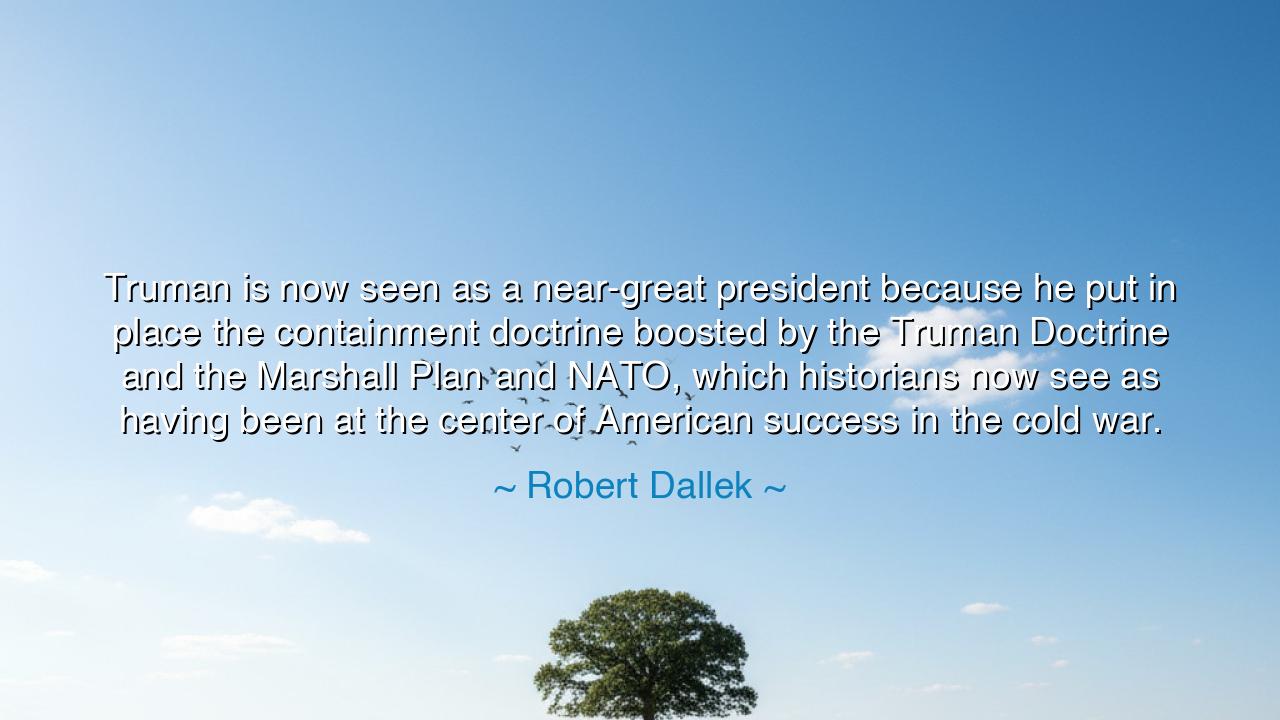
Truman is now seen as a near-great president because he put in
Truman is now seen as a near-great president because he put in place the containment doctrine boosted by the Truman Doctrine and the Marshall Plan and NATO, which historians now see as having been at the center of American success in the cold war.






Hear the words of Robert Dallek, who proclaimed: “Truman is now seen as a near-great president because he put in place the containment doctrine boosted by the Truman Doctrine and the Marshall Plan and NATO, which historians now see as having been at the center of American success in the Cold War.” These are not words of mere description, but a summoning of history’s judgment, declaring that choices made in one age become the pillars upon which future generations stand. In them we hear the lesson that greatness is often unrecognized in its moment, but revealed when time unveils the fruit of vision and courage.
When Harry Truman assumed the presidency, he was thrust into a world trembling with uncertainty. The Second World War had ended, but a new struggle—silent, ideological, unrelenting—had begun. Many doubted Truman, seeing him as ordinary, unfit to follow in the towering shadow of Roosevelt. Yet this “ordinary man” forged extraordinary paths. Through the containment doctrine, he set the guiding principle that would define America’s struggle against Soviet expansion: not reckless conquest, but steady resistance, firm enough to halt tyranny’s spread without plunging the world into ruin.
The Truman Doctrine itself was a declaration not merely of policy, but of moral resolve. When Greece and Turkey stood threatened by communist influence, Truman proclaimed that America would support free peoples resisting oppression. It was more than politics—it was a torch lit for the defense of liberty. From this flame grew a policy that signaled to the world: the United States would not shrink back into isolation, but would bear the burden of protecting freedom wherever it was imperiled.
Then came the Marshall Plan, an act of vision unmatched in modern times. Instead of punishing Europe, shattered by war, America chose to rebuild it. Through aid, through resources, through compassion joined with strategy, the nations of the West rose from rubble into prosperity. This was not charity—it was wisdom, for a Europe rebuilt was a Europe resistant to tyranny. In this act, Truman’s legacy deepened, showing that true success is not won only by the sword, but by the hand that lifts others from despair.
And from this foundation emerged NATO, the shield of the West, a union of free nations bound not by conquest but by mutual defense. This alliance, born under Truman’s watch, became the fortress that deterred aggression and sustained peace through decades of tension. The Cold War was long, filled with peril and near-catastrophe, yet in the end, historians see that the framework Truman built—the doctrine of containment, the aid of the Marshall Plan, the unity of NATO—stood at the very heart of America’s endurance and ultimate triumph.
The meaning here is heroic: greatness is not always loud, nor always recognized in its hour. Truman was mocked by many, underestimated by more, yet the seeds he planted outlasted empires. The Soviet Union rose like a giant, but it fell, not by sudden war, but by the slow, steady, unyielding force of containment, by prosperity in the West, and by alliances that stood firm for half a century. His greatness was revealed not in immediate applause, but in the quiet verdict of history.
Thus, the lesson is clear for all who labor in their own time: do not seek only the glory of the present, but act with vision for the generations to come. Build not for applause, but for endurance. Plant seeds of wisdom, of courage, of generosity, and though they may seem small, they may one day shape the fate of nations. Like Truman, you may not be hailed as great in your day—but history itself may one day call you so.
Practical wisdom follows: in your life, create foundations that will last. Invest in relationships, in communities, in acts of integrity and compassion that endure beyond your lifetime. Resist the lure of immediate reward, and instead build with patience and foresight. For as Truman’s example shows, true success is not measured in days or years, but in the legacy that endures when all else has faded.






AAdministratorAdministrator
Welcome, honored guests. Please leave a comment, we will respond soon